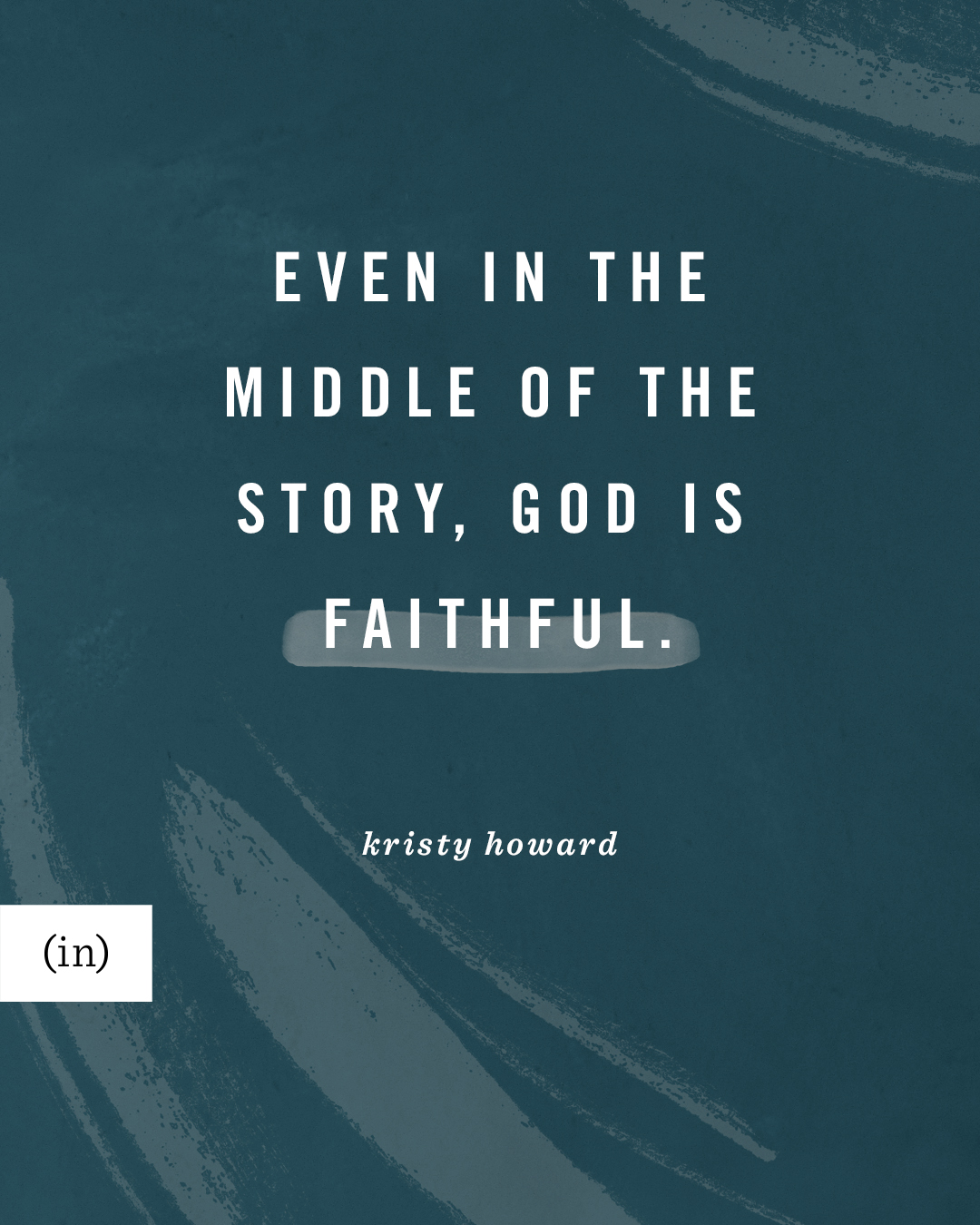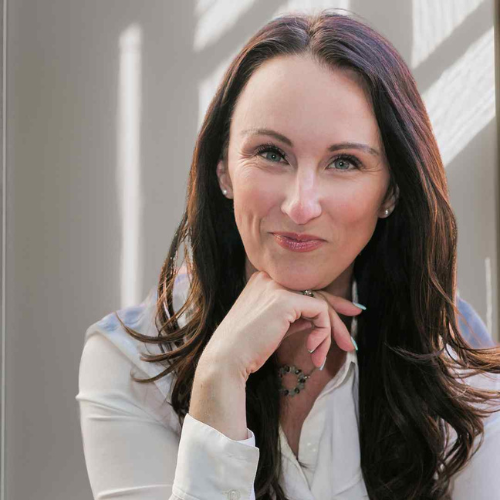I never wanted a story that includes anxiety and depression. I never imagined I’d write sentences with words like “panic attack,” “abuse,” or “shame.” I wanted a neat and tidy story. Something I could fold and tuck away like a well-written testimony for a women’s Bible study or a perfectly captioned Instagram post.
But what I got was real life — and real life is messy.
Real life is the story I never wanted, a story with chapters I still hesitate to open in public. Like the years I was terrified of failing as a mom because I struggled with anger. Or the nights I laid awake, rehearsing conversations I was too afraid to have. Or the mornings I woke up and wondered why God had let things unravel the way He did.
There was a time I didn’t want to tell my story because I didn’t like that it included spiritual wounds, or the slow unpacking of emotional baggage I didn’t know I was carrying. I didn’t want to write about being a people-pleaser so tethered to external approval that I lost my voice somewhere in the process. I didn’t want a story about financial setbacks, or apologizing to my kids for the ways I parented from fear instead of faith.
But, here’s something I’ve learned: We don’t get to pick the plot, but we do get to choose whether we let God be the Author.
In Isaiah 61:3 (NIV), God promises to bestow, “A crown of beauty instead of ashes, the oil of joy instead of mourning, and a garment of praise instead of a spirit of despair.” That promise has become my lifeline in the past few years. Not because everything in my life has been redeemed or wrapped up with a neat bow, but because even in the middle of the story, God is faithful.
I used to think I had to wait until everything made sense before I could share my story. Yet, if I’ve learned anything, it’s that God doesn’t waste our broken parts. Especially not the broken parts.
Psalm 34:18 (ESV) says, “The Lord is near to the brokenhearted and saves the crushed in spirit.” And I’ve seen this up close. In the counseling office where I finally told the truth about my childhood trauma. In the journal pages where I scratched out prayers that sounded more like desperate pleas. In the long walks and whispered apologies to my kids, when I didn’t get it right but wanted to do better.
Sometimes the most sacred place in our story is the one where we realize God is still writing . . . and we don’t have to rush to the ending.
Maybe your story feels disappointing, too. Maybe you thought you’d be further along, more healed, less messy. Maybe you’ve wondered if the parts of your life that feel untellable are just too broken to ever be beautiful.
Friend, your story is still being written and rewritten.
You don’t have to love every chapter to believe God is working. You don’t have to share every detail to know He’s redeeming the narrative. And you don’t have to wait until it all makes sense to start telling the truth.
God, in His grace, whispers, “You’re not disqualified. You’re not too late. You’re not too much.” One of the most radical things we can do is to stop editing our stories to make them palatable and instead invite others into this grace that meets us right where we are.
Maybe our real testimony isn’t about being impressive. Maybe it’s about being honest. Maybe it’s time to stop hiding the pages we’d rather skip and start reading them aloud with a trembling voice and an open heart. Because there’s a woman out there who needs to hear your story to know she’s not alone.
And there’s a Savior who isn’t waiting for your perfection — just your permission to keep writing your story and rewriting your story.
Leave a Comment






Kristy, I think there are so many of us like you just described. I know I am one of those people and am so very grateful for your sharing this. It really helps.
Madeline, I’m so grateful it resonated. Thank you for reading and for taking the time to comment. We are truly not alone in our journeys, and that is a gift! Blessing and love to you. xo
Thank you for sharing this, it reminds me of me. I am glad for that there is a rewriting and that the story is still going and I can always do better. Thank you for your bravery, it’s just so good to know we are all not perfect.
Kristie,
We are definitely not “all perfect” and the best news I ever believed is that we don’t have to be. Thank you for commenting… sending love and grace your way.
P.S. I love your name. 😉
Amen and Amen! Thank you for the words I feel but prefer not to voice. I’m grateful He is still writing my story! I’m constantly looking to make everything right.. and then when I’m in His Presence and Word, confessing , gleaning…everything is right blessings to you and yours. I’m grateful for your story Kristy
Sadie, it’s so hard to say these things out loud, isn’t it? Thank you for taking the time to honestly share in these comments. Your vulnerable feedback means a lot.
Wow! This aligns so well with me. Being messy is something I’ve always strived to get away from. Yet, I’ve always get pulled back into it. The supportive scriptures add such warmth and acceptance to my heart.
Shantell, I have tried to avoid “messy” like the plague! You’re right – we can’t escape it. What a gift to embrace the less-than-beautiful parts of our lives and let God be in charge of making something eternally good out of our brokenness.
Thank you for reading and commenting here. I’m so glad these Scriptures spoke to your heart – they do mine, too.
Thank you for unlocking a part of my story as well.
God has given you your voice to reach even me, a person wearing the skin of childhood abuse, depression, grief, and that almost debilitating attribute of seeking approval by people-pleasing. My cries and prayers to God are written in underlined strokes of pain and hope.
Your words are healing, restoring my quest for peace in God’s arms.
Angela,
Your comment resonates deeply with me. I feel your pain-and most importantly, I know that our Heavenly Father does, too. Blessings on your healing journey, beautiful sister.
Thank you for these words. Brought tears to my eyes! I am old but hopefully the Lord will give me more time. So much more to do! Thank you for the incouragement.
Blessings to you!
Clyda,
It is never too late to live into new chapters of our story. God is so faithful and kind through every season of our lifetimes. I’m so blessed that my words (and story) encouraged you.
Kristy, Thank you so much. My life from childhood to older person is a mess. Yet you have given me consolation. I’m so grateful for all the progress you have experienced. I am making a little progress in sharing my some story with a select few others.
Cynthia,
Keep sharing and keep living into grace and healing. I know you are sharing hope and encouragement with those God is bringing into your story!
Thank you Kristy for sharing your struggles so openly. It helps me very much to know I’m not alone. I have seasons of depression and anxiety and in one now. It isolates me as I have no one to talk to. I am 78 and I thank the Lord Jesus every day for all His many blessings. The Lord visited me in the night about one year ago. His glorious Presence was with me all night long! But I still wish I had a friend to talk with who understands. But I know the Lord understands so I talk to Him all day and in the night. God’s blessings to you all!!!
Donna, anxiety and depression can feel so very isolating. You are never alone – not only is Jesus Christ your faithful companion, but there are so many who struggle with these heavy experiences, too. Sometimes speaking up breaks the silence so that others realize they are not alone.
Thank you for reading here, and for taking the time to share your story and struggles. Praying God sends supportive friends to walk with you through this.
Yes!
Our loving father isn’t looking for perfection, or performance rather he just wants our presence. He wants our hearts.
Spending his summer away,
Lisa
Lisa, and that grace has been the biggest gift of my life. What freedom to walk with a Father who does not demand perfection.
Enjoy these remaining weeks of summer!
Thank you for this story. It’s exactly the words I needed to here today. As if we are kindard spirits, everything you mentioned was what I was thinking. I have been in turmoil in sharing my story. God keeps nudging me,like He did through your words. Praying that you continue to let Him speak through you. God bless.
Kathy, I’m so glad the article resonated with you today. It feels hard and scary to think of sharing your story, but I’m so glad you’re listening to His gentle nudging. Someone, somewhere is ready and waiting to receive what you have to say.
Amen ! Thank you for sharing and encouraging my next steps. You gave voice to my feelings and what God was trying to tell me.
I’m so grateful it resonated, Michelle. Trust His timing and His prompting!
What a testimony. Thank you for sharing your imperfect story. May God’s grace abound towards you and me and all women whose flaws are perfect for God to use.
Amen! Thank you, Carol.
Thank you for this encouragement to stay in faith, to take life as it is, to discover (first by faith and than also by glimpses of sight): God is still writing 🙂
God is still writing… and that is the redemption and the promise!